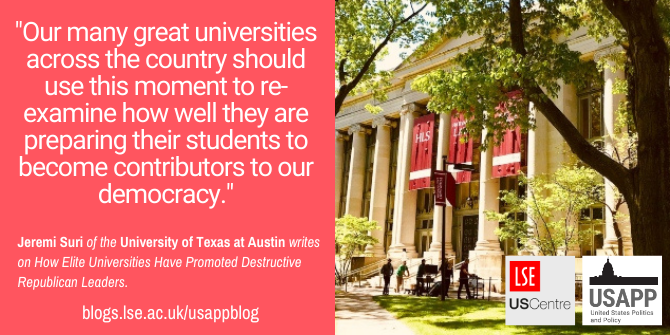 Jeremi Suri writes that while the Republican Party often attacks elite institutions, the party itself is led by graduates of elite universities, institutions which have enabled them to reach their positions of power through self-serving ambition. Elite universities, he argues, must return to their past priority as civic educators, not as engines of privilege.
Jeremi Suri writes that while the Republican Party often attacks elite institutions, the party itself is led by graduates of elite universities, institutions which have enabled them to reach their positions of power through self-serving ambition. Elite universities, he argues, must return to their past priority as civic educators, not as engines of privilege.
Since the founding of the republic, the United States has invested enormous resources in the construction of universities. Our elite universities reflect this enormous investment over time. George Washington was only the first of countless American leaders to declare that advanced university education was essential for the creation of an informed, active, and capable democratic citizenry. The most elite universities promote this vision, promising in their mission statements to “educate citizen leaders” (Harvard), “serve all sectors of society” (Yale), “serve the nation and the world” (Princeton), and “accelerate our purposeful impact in the world” (Stanford).
The persistent attacks on American democratic institutions during the past decade, especially the insurrection against the constitutional certification of presidential electors on January 6th, raise many questions about how well elite universities are fulfilling their stated missions. Although the Republican Party has embraced a populist program that attacks established institutions and knowledge, it is led by privileged graduates of elite universities who achieved their current positions because of the skills and networks they cultivated on their well-endowed college campuses. The populist arguments they make, and the riots they have inspired, are a creature of a destructive elitism, encouraged by the most insidious forms of self-serving ambition in our society.
Elite universities as training grounds for self-serving ambition
Elite universities have fueled self-serving ambitions in their talented students, and they have not done enough to encourage the public service ethic that they expound. Many of their graduates have, of course, made extraordinary contributions to our society, but many have done otherwise. The prominence of elite university graduates among those who have callously undermined our democracy indicates that these institutions have failed to instil a strong civic ethic in all of their students. More damning, the ways some of the most prominent graduates have used their elite university experiences to boost themselves ahead of more civic-minded counterparts raises questions about the overall benefit of universities to our society. Are they making their students better or worse citizens? For too many talented young men and women, elite university education has become a training ground for self-serving ambition, not education and citizenship.
Our many great universities across the country should use this moment to re-examine how well they are preparing their students to become contributors to our democracy. The culture of campus life should encourage civics and service, not primarily self-promotion and material acquisition. Just as universities claim credit for their graduates who win Nobel Prizes and invent life-saving medicines, they must take responsibility for those who spread lies, encourage hate, and harm our society. Institutional responsibility requires a renewed commitment to ensure that the next generation of students receives more intense instruction and consistent encouragement to help society as a whole. Civic education, in its broadest form, must become a priority on campuses again. It is not a priority right now, and our democracy is suffering because of that.
Republicans leaders are often academic elites
A close look at the Republican populists who condemn elites reveals that many are super-elites themselves. Republican members first elected to the U.S. Senate in the last decade are more likely than their Democratic counterparts to have attended Harvard, Yale Princeton, or Stanford Universities (many with multiple degrees from these prestigious schools.) They often attended private preparatory schools before university, and their children are likely to follow the same privileged educational paths. Elected Republicans are, in fact, academic elites who promote populist positions, and that is not a coincidence.
The leaders of the recent attacks on our established practices of democracy are men whose careers were launched by the institutions, particularly prestigious private universities, that they condemn. Senators Josh Hawley (MO), Ted Cruz (TX), and Tom Cotton (AR) are emblematic. Hawley and Cruz led challenges to the presidential electors, even after a mob of Trump supporters attacked the U.S. Capitol on January 6th. Cotton did not join with Hawley and Cruz this time, but he has been a leading Republican advocate for efforts to dismantle the alleged “deep state.” Hawley, Cruz, and Cotton have consistently spread Trump’s lies about “immigrant caravans at the border,” “socialist mayors and governors,” and, most egregious, “illegal votes” in the last election. They know these allegations are false and harmful to our democracy, and they have never presented evidence, but they have spread the lies anyway.
Each of these men has two degrees from Harvard, Yale, Princeton, or Stanford; they do not have a single degree from another, perhaps less prestigious university. Each of them used his elite law school education to procure a coveted clerkship with a prominent appellate or Supreme Court judge, which opened doors to lucrative law firms. Each jumped from well-connected legal practice into politics, with partners and clients as key sponsors. These men distinguished themselves by their talent, their impressive work in elite institutions, and their fealty to distinguished figures with Republican Party bone fides. If there is an “Old Boys Network,” these men placed themselves at the center of it, and that process began at university.
The Republican part of their careerism mattered because it gave them a recognizable brand and it attracted powerful people in their networks who shared that brand to support them. Their patrons knew what to expect of them, or so they thought. Hawley, Cruz, and Cotton leveraged a powerful chain of connections from their universities to their clerkships and law firms to kick-start their political careers. They became the new faces of the Republican Party because they had proven talent and rich Republican supporters. They were the party’s young power elite.
Career building, not community building
But these fast-rising men never thought of themselves as part of the community that nurtured them. That is now clear. The universities, clerkships, law firms, and elected offices matter to them for only one reason: promotion to the next step. They made few close friends and they did little at each step beyond helping themselves. There are no great legislative or community accomplishments in the careers of Hawley, Cruz, and Cotton. They have done nothing of substance to improve the lives of their constituents, often the contrary.
They have only boosted themselves with fiery speeches and clever political maneuvers. When Cruz and Hawley spoke at the Capitol on January 6th, they were visibly disdained by most of their colleagues, but it did not matter to them. They spoke only for the cameras and a core of hateful citizens they wished to activate for more damaging lies about our presidential election. They continued to trash the Constitution, in hopes of promoting themselves as right-wing saviors.
Since their election to the Senate, these men have clawed for the presidency. They have positioned themselves to capture the most vocal Republican activists and donors, rather than win over the party or the country as a whole. They have treated their current high office as a perch for self-promotion, not a position to enact meaningful programs for the public good. Notice how often they attack rivals and encourage division, how infrequently they reach out for common ground. They are flagrant vigilantes, inciting a rabid crowd (the widely circulated photo of Hawley pumping his fist to encourage the rioters at the Capitol illustrates this), not the quiet coalition builders needed for successful legislation.

Photo by Emily Karakis on Unsplash
To jump the senior figures in their parties, and grasp for the presidency so early in their careers, Hawley, Cruz, and Cotton have had to undermine the institutions and traditions in our democracy that, for more than two centuries, demanded more productive and congenial qualities from leaders. This is their radicalism – lighting a fire to Congress, the established party system, even the U.S. Constitution, so that they can then climb atop the debris. When Hawley and Cruz continued to make unfounded objections to certified presidential actors, even after Trump’s insurgents ransacked the Capitol, they were fanning the flames and climbing the barricades, further shaking our unsteady democracy.
Hawley, Cruz, and Cotton promote themselves by attacking the system that made their meteoric careers possible. They are only in a position to benefit from this destruction because the system worked so well for them. Their attacks on elite institutions are not populist, but instead narcissistic. Like the bourgeois revolutionaries criticized by Karl Marx, these prodigal sons are condemning the people and institutions which lavished them with privileges so that they can have all the privileges for themselves. The Constitution, and our democracy as a whole, are expendable to them for personal gain.
Elite universities are enablers of privilege from the ground up
These three Senators got their start in higher education. It is impossible to imagine their careers without the prestige and networks of elite universities. This puts to rest the misguided accusation that universities are bastions of liberal indoctrination. The most prestigious universities are clearly producing a fair share of powerful leaders on the right. And figures like Hawley, Cruz, and Cotton continue to benefit from their connections to other like-minded graduates of these universities. Remember how quickly they rallied around Supreme Court nominee, Brett Kavanaugh, who has two degrees from Yale.
Our best universities are promotion and networking machines for supremely talented students. They gain entrance based on their ability to out-brag other talented young men and women, often with long lists of extracurricular activities that make them sound more like supermen than teenagers. Once admitted, they continue the same pattern of flagrant over-achievement, enrolling in advanced courses, participating in high-level internships, joining well-connected clubs, and cultivating other elites who will help them stand out at the next level. The process continues in graduate school, court clerkships, law firms, and then partisan politics. These privileged figures have real talent and they work hard, but the distinctive role of elite universities is to help them promote themselves farther and faster.
They are the best and the brightest, but where is their commitment to a higher calling, to a better society? Elite universities promote public improvement in their mission statements, and they draw on extensive federal, state, and philanthropic resources. Yet, their classes and activities on campus regularly place the success of their students above training and encouragement to serve others. Academic programs are designed to get students through a series of required courses and exercises efficiently, with minimal disruptions. College life is organized more often for entertainment and socializing rather than intellectual exploration. Compare the astronomical expenditures on athletics and flamboyant buildings with the always tight funding for the liberal arts, where civic values are often taught.
Above all, universities emphasize individual achievement over the collective good. Students are admitted for being exceptional, they are graded for their individual work, and then they graduate to impressive jobs. Each student is exceptional and told to act that way. Elite universities present an ethos that promotes the talented student to greater personal heights; improving society is usually a secondary consideration, at best.
Of course, it is easiest to grade universities on the successes of their graduates and it is much more difficult to determine what would actually serve the public good. University administrators are rewarded for the happiness and wealth of their graduates, not the sacrifices students make to improve the lives of others, particularly those who never attended their university. Too often, highly talented students are encouraged to use the university to serve themselves above all – a source of entitlement and credentialing. Elite colleges collect hefty private tuition and they offer what amounts to a largely private good.
A plan for renewing civic consciousness
The insidious forms of self-serving ambition that threaten our democracy today grow partially from our elite institutions and their students who are taught to tear them down after graduating, as firewood for their next blazing success. The self-promotions of some of the most talented graduates are authoritarian and incentivized through educated careerism. Universities cannot correct this destructive culture alone, but they can use their abundant resources and incandescent prestige to double-down on renewing a civic consciousness in their students.
Which courses and experiences might convince future leaders like Hawley, Cruz, and Cotton to value democracy and public service above their climb to the presidency? How can elite universities encourage super talented students to become better and more intentional contributors to the collective good? These are challenging questions, and they place a heavy burden on universities, but they offer a necessary route to what would be a more authentic populism than the destructive narcissism of current partisan politics.
University leaders might renew their civic mission in this time of democratic crisis by re-thinking the culture on their campuses. Too much debate surrounds whether campuses are excessively liberal or insufficiently progressive. In reality, they are highly corporate, driven by access to resources and pressures to prevent controversy. They rank themselves by measures of public perception, not educational depth or societal improvement. Perhaps universities could use this moment to renew focus on these latter two components of their mission.
Educational depth requires an intentional rejection of professionalization, which currently dominates campuses. College is not trade school. The atmosphere on campuses should emphasize discovery, experimentation, and a critical analysis of conventional beliefs. University leaders and faculty should repeatedly prompt students to think less about themselves and more about the larger historical and contemporary fabric of society. This means collaborative work, conversation, and invitation to compromise. Instead of autonomous individuals working to score high grades and impress professors, students should see themselves as part of a shared, evolving learning community.
Some of these elements are part of the traditional liberal arts approach to college, but there is much more. Talented future politicians and business leaders need role models. The university must open its doors widely to figures who manifest the values of public service in their careers and their continued passions. Instead of encouraging men like Hawley, Cruz, and Cotton to form their owned biased professional networks, universities should actively work to build better, bipartisan, and public-focused networks for their students. Internships should be less about professional advancement, more about learning and service, and better integrated in the core of the university experience. Coursework should espouse and practice the civic engagement we expect students to pursue after graduation.
Cultivators of democracy through civic ethics
All of this important work requires a willingness to challenge students – their beliefs, their self-assurance, and their preconceived notions of success. Universities must be willing to push students to think beyond their material goals and themselves. This cannot be achieved with one set of readings or even a series of courses. It must be the daily ethos of campus, imbued in all activities around college. This means continuously asking if what we are doing is benefiting society, and how those benefits can be expanded in scale and scope. Material accomplishments are only part of this equation; the quality of life in a democracy must stand as the true test for the utility of scholarship and pedagogy.
Hawley, Cruz, and Cotton obviously did not cultivate a civic ethic during their time in our most elite universities. And they are not unique. More of the leaders in our society possess fancy university degrees than ever before, but the history of the last decade indicates that they are less attentive to democratic expectations of equality, justice, and shared power than their less educated predecessors. Public service has become more of a private benefit for the most privileged. Resources are hoarded and the needs of large parts of the population are ignored by those who are capable of doing more. Higher education has itself become inaccessible for many citizens because of cuts in public funding by the very educated figures who relied on the best universities for their careers. Figures like Hawley, Cruz, and Cotton are closing the doors of opportunity behind them.
The crisis of our democracy is therefore, in part, a failure of our universities. They have nurtured too many self-promoting narcissists who have, in turn, hijacked our government. To win back our representative institutions we must produce more men and women imbued with a civic ethic and a commitment to the public good above all. Universities must re-define their success by their work to strengthen our democracy.
Our founders understood that a republic did not rise from a book or even a constitution. It grew from the practices of citizens, working together to serve the public good through representative institutions and shared powers. Citizens would learn democratic practices on their farms, in their towns, and in their schools. Universities would cultivate those practices for the most talented, making them models for others.
Due to its economic successes higher education has strayed from this mission – the money in professionalism, product marketing, and sports entertainment is just too tempting. The rewards for promoting the wealth of graduates are just too great. Our current crisis, and the role of the best and the brightest graduates in destroying so much, demands that we take stock and re-think what our universities should really be about. Until college leaders, faculty, and students ask how we can cultivate better leaders for our democracy, we never will.
- A version of this article first appeared at The Constitutionalist.
Please read our comments policy before commenting.
Note: This article gives the views of the author, and not the position of USApp– American Politics and Policy, nor of the London School of Economics.
Shortened URL for this post: https://bit.ly/3iXPUOc
About the authors
 Jeremi Suri – University of Texas at Austin
Jeremi Suri – University of Texas at Austin
Jeremi Suri is the Mack Brown Distinguished Chair for Leadership in Global Affairs at The University of Texas at Austin in the university’s Department of History and the LBJ School of Public Affairs.






